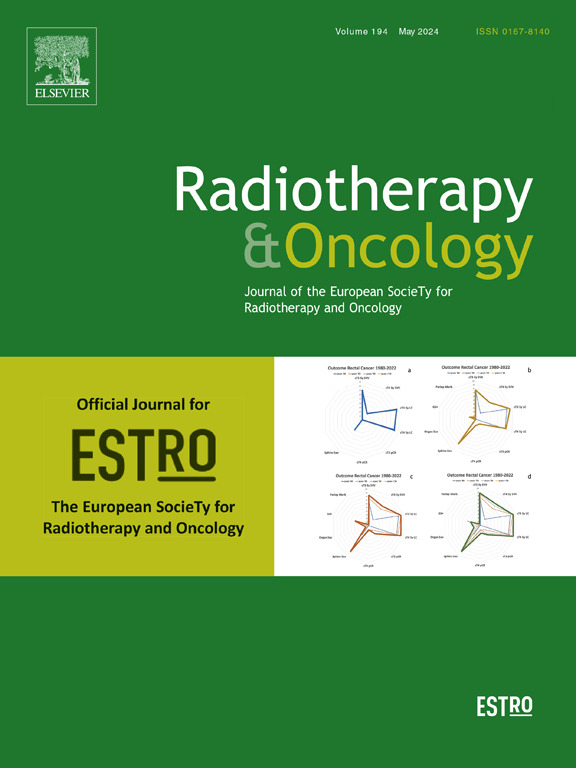Radiotherapy quality assurance for the PEACE 1 trial: An individual case review analysis
IF 4.9
1区 医学
Q1 ONCOLOGY
引用次数: 0
Abstract
Purpose
Radiotherapy quality assurance (RTQA) is essential for ensuring adherence to trial protocols. This paper summarizes the individual case review (ICR) results from the PEACE-1 trial, a phase-III study investigates standard of care (androgen deprivation therapy with or without docetaxel) with or without local radiotherapy; and with or without abiraterone acetate plus prednisone in patients with metastatic hormone-sensitive prostate cancer (mHSPC).
Materials and methods
Participating institutions submitted radiotherapy (RT) plans for central review, assessing protocol compliance in target volume and organs at risk (OARs) delineation, as well as dose specifications. ICRs were conducted either retrospectively (r-ICRs), after starting RT, or prospectively (p-ICRs), before RT initiation. Case reviews were categorized as acceptable per protocol, acceptable variation, or unacceptable variation based on delineation and dose and plan parameters.
Results
Out of 585 patients in the RT arms, 527 (90%) had r-ICRs, primarily using intensity-modulated radiotherapy (IMRT). Delineation review approved 417 (87%) r-ICRs and 44 (92%) p-ICRs. The main reasons for unacceptable delineation were erroneous clinical target volume (CTV) delineation. In dose and plan reviews, 399 (96%) r-ICRs cases and 46 (96%) p-ICRs were approved, with unacceptable cases primarily due to PTV dose distribution issues.
Conclusion
RTQA is crucial in prostate cancer trials, primarily for proper target volume delineation. It is recommended to omit r-ICRs due to resource demands and lack of impact on RTQA outcomes, using limited p-ICRs with early feedback for site deviations and reserving full p-ICRs for trails with new techniques or dose regimens.
ClinicalTrials.gov: NCT01957436.
PEACE 1试验的放疗质量保证:个案回顾分析。
目的:放射治疗质量保证(RTQA)是确保遵守试验方案的必要条件。本文总结了PEACE-1试验的个案回顾(ICR)结果,PEACE-1试验是一项调查标准护理(雄激素剥夺治疗加或不加多西紫杉醇)加或不加局部放疗的iii期研究;以及在转移性激素敏感前列腺癌(mHSPC)患者中使用或不使用醋酸阿比特龙加强的松。材料和方法:参与机构提交放射治疗(RT)计划供中央审查,评估方案在靶体积和危险器官(OARs)划定方面的合规性,以及剂量规格。ICRs在开始放疗后进行回顾性(r-ICRs),或在开始放疗前进行前瞻性(p-ICRs)。病例回顾按方案可接受、可接受的变化或基于描绘、剂量和计划参数的不可接受的变化进行分类。结果:在放疗组的585例患者中,527例(90%)有r-ICRs,主要使用调强放疗(IMRT)。划定审查批准了417个(87%)r-ICRs和44个(92%)p-ICRs。不能接受的主要原因是错误的临床靶体积(CTV)描绘。在剂量和计划审查中,399例(96%)r-ICRs和46例(96%)p-ICRs获得批准,其中不可接受的病例主要是由于PTV剂量分布问题。结论:RTQA在前列腺癌试验中至关重要,主要是为了适当的靶体积描绘。由于资源需求和对RTQA结果缺乏影响,建议省略r-ICRs,使用有限的p-ICRs和早期对地点偏差的反馈,并保留完整的p-ICRs用于新技术或剂量方案的试验。Clinicaltrials: gov: NCT01957436。
本文章由计算机程序翻译,如有差异,请以英文原文为准。
求助全文
约1分钟内获得全文
求助全文
来源期刊

Radiotherapy and Oncology
医学-核医学
CiteScore
10.30
自引率
10.50%
发文量
2445
审稿时长
45 days
期刊介绍:
Radiotherapy and Oncology publishes papers describing original research as well as review articles. It covers areas of interest relating to radiation oncology. This includes: clinical radiotherapy, combined modality treatment, translational studies, epidemiological outcomes, imaging, dosimetry, and radiation therapy planning, experimental work in radiobiology, chemobiology, hyperthermia and tumour biology, as well as data science in radiation oncology and physics aspects relevant to oncology.Papers on more general aspects of interest to the radiation oncologist including chemotherapy, surgery and immunology are also published.
 求助内容:
求助内容: 应助结果提醒方式:
应助结果提醒方式:


